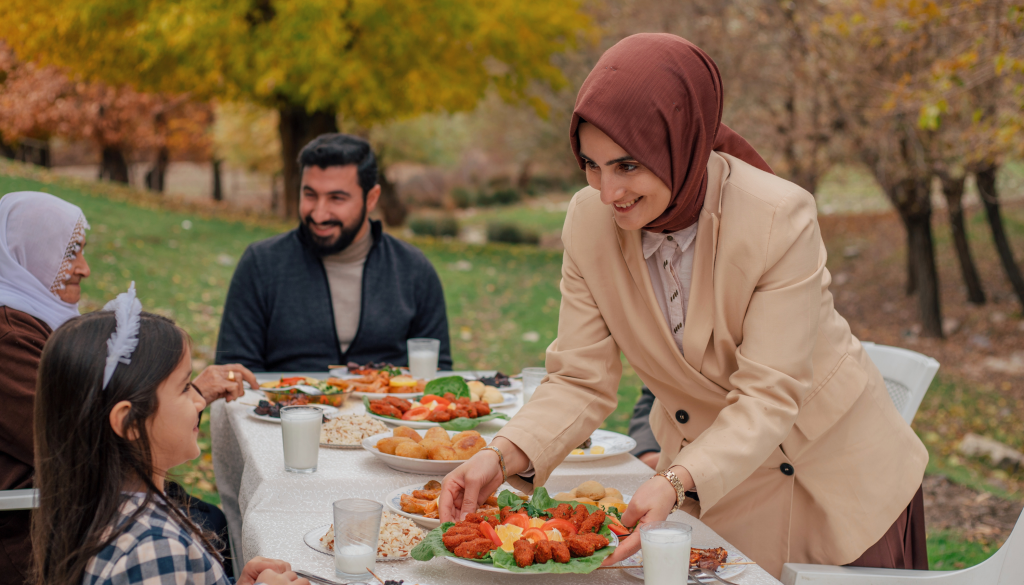So we’ve decided to get married. We’ve found the perfect partner. He ticks all the boxes on our spouse checklist and more. But wait a minute, what’s this? A mother, a father, an older brother, a younger brother, and half a dozen sisters, nephews, and/or nieces come with him. But what does it mean? Does this mean the end of the marital paradise we had only just been envisaging?
All too often, when we are looking to get married, we focus on the person we are hoping to wed – his character and attributes. We forget that he may come with an entourage, and a large one at that. Or we may insist that we live entirely separate from ‘the family’ as we fear them taking over our lives, and in doing so, ensure that we remain ‘outlaws’ and outsiders while our husbands become human ping pong balls.
Of course, there are families in which, no matter what we do, we will remain the outlaw. Some mothers will never see their sons as anything but theirs, and we are cast as the ‘other woman from the moment we agree to marry their sons. So what do we do? Hold out for an orphan? Not too many of them around. Below are some ways we might overcome some of the difficulties that might arise during the course of our marriages.
Clarify intentions
Anything done for the sake of Allah (SWT), fi sabeelillah, cannot be wrong. Marriage and relationships founded on the wish to please Him and Him alone seem more manageable despite their inevitable hardships. Intentions need to continually renew as there will be times that our egos may take a little hammering, particularly when we feel we have done something well, for the right reasons, or have worked hard but are not acknowledged. For example, we’ve invited all the in-laws around for dinner, worked all day in the kitchen, and been the most gracious of hostesses, with only any number of things to be criticized or looked down upon. I recall hearing from a Shaykh that when our egos become bruised, we need to examine how much our nafs was involved in what we did. The degree to which we are hurt is how we act according to our nafs and in search of praise and appreciation. When we do things with the intention of servitude to Allah (SWT), the reward is ours whether or not others acknowledge what we have done.
Think of your own family and parents
‘Do unto others as we would have done unto us. Imagine how we would like to see our family, particularly our parents, treated. Yes, as clarified in the May edition of Sisters (Caring for our parents: finding the balance), a son is responsible for the care of his parents, and a wife’s duty is to her own, but what harm would it do to aid our husbands in the care of their parents. Would we not wish the same from our partners and the spouses of our siblings towards our parents? Showing the level of care towards our in-laws that we offer our parents can increase our love, especially when they know that we are not duty-bound or obligated to do so but that we choose to do it.
Step into our mother-in-law’s shoes
Or any of our in-laws’ footwear. Just as things are changing for us as a consequence of our marriage, they also change for them. Perhaps it is not the same degree for all the in-laws, but even so, an adjustment is necessary to accommodate the addition to the family. Think about a new addition to our lives, either through marriage or birth: how the person who is now married or has given birth is no longer available in the same way. Likewise, we must be sensitive to what our in-laws might perceive as a loss. We will have achieved something incredible if we can show them they are gaining rather than losing. Also, suppose we remind ourselves that our husbands’ mothers, our mothers-in-law, can never be repaid by their sons for bearing and rearing them, as no mother can be. In that case, we can remain appreciative of what they have done – particularly if our husbands are kind, loving, and well-mannered.

Build relationships
You can get to know each member of your new family individually when spending time with them, with and without your husband. As we know, any relationship requires time and effort and what we put in is often what we get out. Make an effort, and you will, bi’idhnillah, reap the rewards.
Discussion
Have a discussion, preferably before marriage, about how you and your spouse will handle different scenarios that might arise, alongside what you expect from each other concerning your families. If you are clear from the outset about what is wanted, then problems are less likely to occur, and if they do, you know where you stand. Talking about things as they arise and expressing yourself facilitates understanding, while keeping quiet and bottling things up creates tension. Always consider it teamwork; you are on the same side, wanting what is best for each other and the family. If you do, it is more probable that the two of you will work together instead of against each other.
Patience and gratitude
Focus on the positive characteristics, be grateful for these, and be patient with the complicated stuff. We all need to remind ourselves how much we have and how much worse off we could always be. Sabr and shukr, as they say, are beautiful things.
Be respectful but be just.
We also must remember that our in-laws are our husbands’ blood relatives and our children’s. Some, especially the parents-in-law, will be our elders, and as such, we need to be respectful – but that does not mean we should put up with anything:
“O you who believe! Stand firmly for justice, as witnesses to Allah, even if it be against yourselves, your parents, and your relatives, or whether it be against the rich or poor …” (An-Nisa: 135)
… Do not oppress and do not be oppressed.” (Al-Baqarah: 279)

The Messenger of Allah (SAW) said: ‘Help your brother, whether he is an oppressor or is oppressed.’ A man asked: ‘O Messenger of Allah! I (know how to) help him when he is oppressed, but how can I help him when he is an oppressor?’ He (SAW) said: ‘You can restrain him from committing oppression. That will be your help to him.’ (Bukhari & Muslim)
For instance, if a mother-in-law insists on you doing something that is culturally a tradition but is outside the bounds of Islam, you can state that this is something you are not willing to do and provide an explanation if necessary and ask for—for example, hugging your adult brother-in-law. I know that things can feel pressured when these sorts of differences arise. However, if you are firm but polite, confident yet compassionate, then, insha Allah, the message will get across.
The relationship with in-laws can be a difficult one, or it can be a fruitful one. We must recognize our part in making it a success and work towards it. If we do, we will become part of the family, and the days of being an outlaw will be far behind us, bi’idhnillah.


